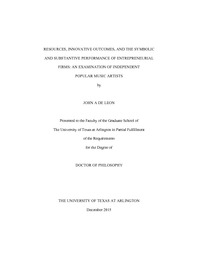
ATTENTION: The works hosted here are being migrated to a new repository that will consolidate resources, improve discoverability, and better show UTA's research impact on the global community. We will update authors as the migration progresses. Please see MavMatrix for more information.
Show simple item record
| dc.contributor.advisor | Perez-Nordtvedt, Liliana | |
| dc.creator | Deleon, John A | |
| dc.date.accessioned | 2016-01-26T23:06:28Z | |
| dc.date.available | 2016-01-26T23:06:28Z | |
| dc.date.created | 2015-12 | |
| dc.date.issued | 2015-11-30 | |
| dc.date.submitted | December 2015 | |
| dc.identifier.uri | http://hdl.handle.net/10106/25444 | |
| dc.description.abstract | The importance of innovation to the success of entrepreneurial firms has been well established in prior work. Yet, important gaps still remain. I draw from the innovation literature, the resource-based view, and institutional theory in order to address how entrepreneurial firms are able to find success through innovation in competitive environments. Specifically, following Penrose’s (1959) approach to the resource-based view, I argue that two resource categories, creativity-related resources and management-related resources, form antecedent conditions for innovative outcomes. I divide these innovative outcomes into two separate components, innovative output and innovative uniqueness. Further, I argue that innovative output and innovative uniqueness have opposing effects on the symbolic and substantive performance of an entrepreneurial firm. Finally, I consider the moderating impact of institutional environments on the relationship between innovative uniqueness and the symbolic and substantive performance of an entrepreneurial firm. Empirical analysis of 800 popular music artists provides evidence to support the role of creativity-related resources and management-related resources in driving innovative outcomes. However, contrary to my predictions, I failed to find strong support for the opposing effects of innovative output and innovative uniqueness on the entrepreneurial firm’s symbolic and substantive performance. Strong support was found for the positive impact of innovative output on symbolic and substantive performance, while only mixed support was found for a negative relationship between innovative uniqueness and symbolic performance. Although I used independent recording artists in the popular music industry as a context, my arguments are likely generalizable to entrepreneurial firms that face strong pressure to innovate. Overall, this study provides clarity to the dilemma of entrepreneurial firms that are called to be both distinctive and conventional in order to find success in competitive markets. | |
| dc.format.mimetype | application/pdf | |
| dc.language.iso | en_US | |
| dc.subject | Symbolic performance | |
| dc.subject | Legitimacy | |
| dc.subject | Entrepreneurship | |
| dc.subject | Creative industry | |
| dc.subject | Recording artist | |
| dc.subject | Music industry | |
| dc.subject | Popular music | |
| dc.subject | Resources | |
| dc.subject | Innovation | |
| dc.title | Resources, innovative outcomes, and the symbolic and substantive performance of entrepreneurial firms: an examination of independent popular music artists | |
| dc.type | Thesis | |
| dc.date.updated | 2016-01-26T23:08:35Z | |
| thesis.degree.department | Management | |
| thesis.degree.grantor | The University of Texas at Arlington | |
| thesis.degree.level | Doctoral | |
| thesis.degree.name | Doctor of Philosophy in Management | |
| dc.type.material | text | |
Files in this item
- Name:
- DELEON-DISSERTATION-2015.pdf
- Size:
- 1023.Kb
- Format:
- PDF
This item appears in the following Collection(s)
Show simple item record


